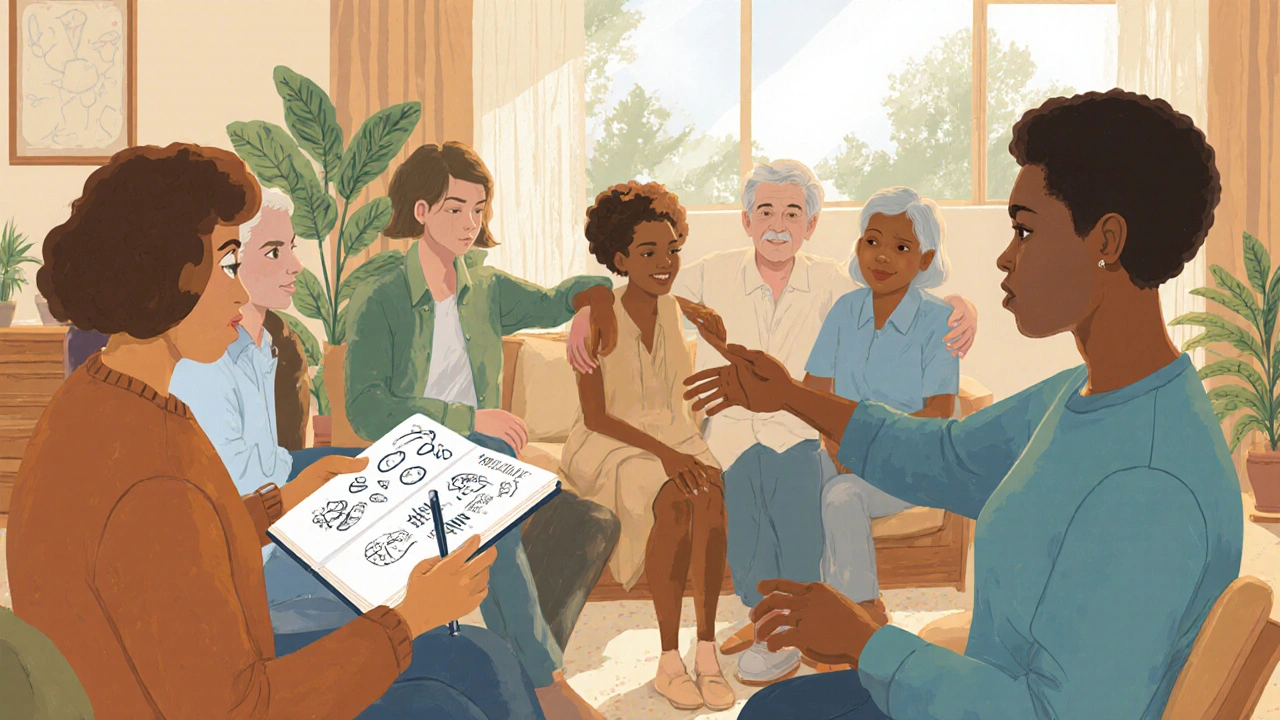Psoriasis Self-Esteem Tracker
Track your emotional well-being and identify coping strategies for plaque psoriasis.
How confident do you feel today?
How often do you avoid social situations because of your skin?
How much does your skin affect your daily mood?
Living with visible skin flare‑ups can feel like walking around with a spotlight on an unwanted feature. When the patches and scaling of Plaque Psoriasis a chronic inflammatory skin condition that produces red, scaly plaques appear on the elbows, scalp, or face, it’s not just the physical discomfort that shows up - your confidence can take a hit too. This article unpacks why plaque psoriasis often drags self‑esteem down, how it meshes with mental health, and what practical steps you can take to feel better in your own skin.
TL;DR - Quick Takeaways
- Plaque psoriasis affects self‑esteem by altering body image, inviting social stigma, and triggering anxiety or depression.
- Key emotional drivers include visible lesions, fear of judgment, and loss of control over appearance.
- Effective coping mixes medical treatment, skin‑friendly styling, and mental‑health strategies like CBT and support groups.
- Building a supportive network and focusing on strengths can rebuild confidence faster than you expect.
- Regular check‑ins with a dermatologist and a mental‑health professional create a balanced plan.
Why Plaque Psoriasis Hits the Self‑Esteem Button
The link between skin health and confidence is surprisingly strong. Self‑Esteem the personal evaluation of one's own worth is built on how we think others perceive us. When Skin Lesions the raised, inflamed patches typical of plaque psoriasis become a daily visual cue, they can dominate that internal dialogue.
Three psychological mechanisms are most common:
- Body Image Distortion: The brain starts to prioritize the affected areas over other traits, narrowing the self‑concept.
- Social Stigma: People often misinterpret plaques as contagious or as a sign of poor hygiene, leading to awkward looks or comments.
- Loss of Control: Flare‑ups can be unpredictable; feeling at the mercy of a condition fuels helplessness.
These triggers compound, making it easy for someone with plaque psoriasis to slip into a negative self‑view.
How Mental Health Intersects with Skin Symptoms
Dermatology and psychology share a two‑way street. Stress can amplify inflammation, which in turn can worsen lesions - a loop that feeds anxiety and depressive symptoms. According to a 2023 population study, people with moderate‑to‑severe plaque psoriasis are 1.5 times more likely to report clinical depression than those without the condition.
Key mental‑health concepts to watch:
- Anxiety excessive worry about appearance and social interactions often spikes before social events.
- Depression persistent low mood that can erode motivation for treatment may surface when flare‑ups become chronic.
- Social Isolation withdrawing from friends or activities due to fear of judgment reduces the emotional support that buffers stress.
Understanding this interdependence helps you target both skin and mind.

Therapeutic Options that Boost Confidence
Medical treatment is the first line of defense, but not all therapies address the emotional fallout directly. Below is a quick snapshot of common interventions and how they impact self‑esteem.
| Option | Typical Use | Impact on Appearance | Psychological Benefit |
|---|---|---|---|
| Topical Corticosteroids | Mild‑to‑moderate flare‑ups | Reduces redness and scaling within weeks | Quick visual improvement can lift mood |
| Vitamin D Analogues | Maintenance therapy | Gradual flattening of plaques | Steady progress supports confidence |
| Biologic Therapies (e.g., IL‑17 inhibitors) | Severe or resistant disease | Often clears >90% of skin lesions | Radical change can reset self‑image |
| Phototherapy (UVB) | Diffuse involvement | Improves texture and color uniformity | Clinic visits provide structured support |
| Cognitive‑Behavioral Therapy (CBT) | Adjunct for anxiety/depression | Does not alter skin directly | Equips coping skills, reduces self‑criticism |
Choosing the right mix often requires a partnership between a dermatologist and a mental‑health professional. The goal is not only clearer skin but also a steadier sense of self.
Practical Ways to Reclaim Your Confidence Today
Medical care can take weeks or months, but there are everyday habits that give an instant confidence boost.
- Style Strategically: Wear clothing that covers troublesome areas without feeling hidden. Layered looks, patterned scarves, or tailored cuts shift focus from the skin.
- Skin‑Care Rituals: Gentle moisturizers with ceramides reduce itch and cracking, making the skin feel softer and more manageable.
- Mirroring Positivity: Write down three things you like about yourself each morning - a skill, a personality trait, or a non‑skin‑related achievement.
- Micro‑Social Wins: Start with low‑stakes interactions (a quick hello to a barista) to train your brain that others aren’t judging you.
- Seek Community: Online forums or local support groups let you share tips, hear success stories, and feel less isolated.
These small steps stack up, creating a feedback loop where feeling better leads to more proactive behavior.
When to Ask for Professional Help
Sometimes the emotional burden outweighs the physical symptoms. Here’s a simple checklist:
- Feelings of hopelessness or persistent sadness lasting more than two weeks.
- Avoidance of social events you previously enjoyed.
- Significant sleep disturbances caused by itching or worry.
- Thoughts of self-harm or self‑neglect.
If you tick any of these boxes, schedule an appointment with a dermatologist and a licensed therapist. Integrated care models, often found in major Canadian hospitals, streamline referrals so you don’t have to navigate two systems alone.
Long‑Term Outlook: Building Resilience
Living with plaque psoriasis is a marathon, not a sprint. Research shows that patients who practice regular stress‑reduction (mindfulness, yoga, or even daily walks) report fewer flare‑ups and higher self‑rating scores on confidence surveys. The key is consistency: treat your skin, treat your mind, and treat your lifestyle as one interconnected system.
Remember that your worth isn’t defined by a patch of skin. Over time, the combination of effective treatment, supportive people, and personal habits will rewrite the narrative from “I’m hiding” to “I’m thriving.”

Frequently Asked Questions
Can plaque psoriasis cause depression?
Yes. Studies from 2022‑2024 consistently show higher rates of clinical depression among people with moderate‑to‑severe plaque psoriasis. The visual impact, social stigma, and chronic pain all contribute to mood disturbances.
Are there skin‑friendly makeup options for covering plaques?
Mineral‑based foundations with a non‑comedogenic label work well. Look for products containing zinc oxide or titanium dioxide; they calm inflammation while providing coverage.
How quickly do biologic drugs improve self‑esteem?
Many patients notice visible skin clearing within 8‑12 weeks, which often translates to a measurable boost in confidence scores. Emotional benefits can continue to rise as skin stays clear.
Is CBT effective for psoriasis‑related anxiety?
Cognitive‑behavioral therapy targets negative thought patterns about appearance. Trials show a 30‑40% reduction in anxiety scores when CBT is combined with standard dermatologic care.
What lifestyle changes help keep flare‑ups at bay?
Regular exercise, a balanced diet low in processed sugars, adequate hydration, and stress‑management techniques (meditation, deep‑breathing) have all been linked to fewer and milder psoriasis episodes.


Scott Kohler
September 30, 2025 AT 17:56It is clear that the pharmaceutical industry prefers you to attribute your self‑esteem woes solely to plaque psoriasis, because each prescription pad they fill translates into another line on their profit ledger. They subtly insist that only powerful biologics will restore your confidence, while ignoring the simple, everyday coping strategies that actually empower patients. Moreover, the very notion that skin appearance dictates worth is a socially constructed narrative, perpetuated by media and corporate interests. If you look beyond the marketing, you’ll see that true resilience stems from personal agency, not from a bottle of medication.
Hutchins Harbin
September 30, 2025 AT 19:03While the conspiratorial angle is entertaining, the data indeed show that holistic approaches-such as cognitive‑behavioral therapy, community support, and consistent skin care-play a pivotal role in rebuilding self‑esteem. Your dramatics aside, it’s essential to recognize that empowerment comes from integrating medical treatment with mental‑health practices. So, the real battle isn’t against a hidden agenda but against the internalized stigma that society feeds us.
Lief Larson
September 30, 2025 AT 20:10Psoriasis is more than a skin issue it affects how you see yourself and how others see you. Simple lifestyle tweaks like dressing in layers can shift focus away from plaques and boost confidence. Remember cultural acceptance varies but sharing your story often breaks the silence.
Julia Grace
September 30, 2025 AT 21:16Theres a lot of good tips here.
Sadie Bell
September 30, 2025 AT 22:23You got this keep shining!
kristine ayroso
September 30, 2025 AT 23:30Alright folks, let’s dive deep into the game plan for beating that confidence dip when plaque psoriasis decides to make a cameo. First off, celebrate every tiny victory – whether it’s a clear patch after a week of moisturizin or a compliment you actually believe. Next, create a “confidence kit” that includes your favorite moisturizer, a stylish scarf that you feel good in, and a list of three non‑skin‑related strengths you own. Don’t underestimate the power of music; blasting your anthem while you apply treatment can turn a boring routine into a mini‑dance party. Remember to schedule regular check‑ins with both your dermatologist and a therapist – treating the skin and the mind together is non‑negotiable. When flare‑ups happen (and they will), have a backup outfit ready so you never feel caught off‑guard. Practice positive self‑talk in the mirror, even if it feels cheesy at first – it rewires those negative neural pathways. Reach out to online communities; sharing photos and stories with people who truly “get it” slashes isolation in half. If you’re feeling shy about posting, start by commenting on someone else’s post and gradually work up to sharing your own journey. Keep a journal of triggers – stress, diet, weather – and notice patterns, then tweak your lifestyle accordingly. Exercise, even a short walk, releases endorphins that calm both itch and anxiety. Hydration is your secret weapon – drink water like it’s your new skin supplement. Don’t forget to reward yourself for sticking to the plan; a new book or a coffee date is a perfect incentive. And finally, be ruthless with the negative voices – whether they’re strangers on the internet or that inner critic. You are more than the plaques, you are a whole person with talents, humor, and an unstoppable spirit. Keep pushing, keep thriving, and watch your self‑esteem rise like the tide after a storm.
Dylan Hilton
October 1, 2025 AT 00:36That’s a solid roadmap! Just a tiny suggestion: consider adding commas after introductory phrases like “First off” and “When flare‑ups happen” for smoother reading. Overall, the enthusiasm really shines through.
Christian Andrabado
October 1, 2025 AT 01:43The article omits the word “and” in several places; also “psoriasis” should be capitalized when starting a sentence.
Jennifer Pavlik
October 1, 2025 AT 02:50Remember, small steps lead to big changes.
Jacob Miller
October 1, 2025 AT 03:56Honestly if you aren’t trying harder you’ll stay stuck.
Debra Cine
October 1, 2025 AT 05:03Great info! 😊 Keep spreading the positivity!
Rajinder Singh
October 1, 2025 AT 06:10In summation, the intricate interplay between dermatological treatment and psychosocial resilience demands a multidisciplinary approach. One must not only address the inflammatory cascade with appropriate therapeutics but also fortify the mind against societal prejudice. The evidence underscores that patients who engage in structured support systems exhibit markedly improved self‑esteem metrics. Therefore, clinicians are urged to integrate behavioral health referrals as a standard component of psoriasis management. Let us, as a collective, champion both skin health and inner confidence with equal vigor.